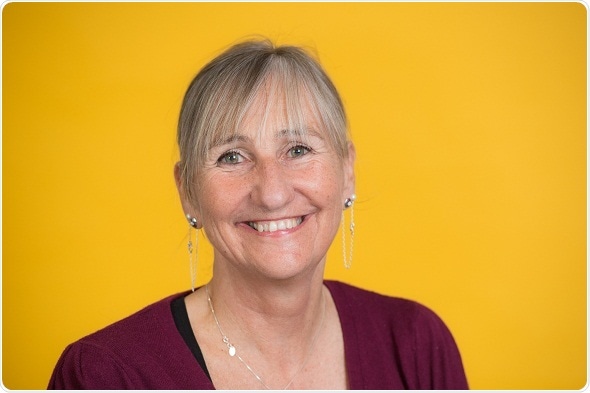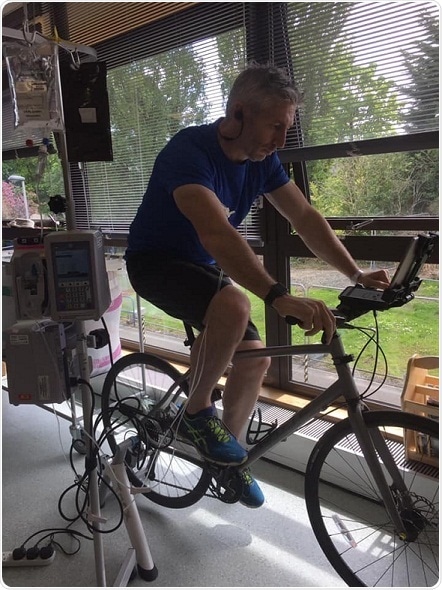A global panel of exercise oncology experts today published new guidance recommending the systematic use of an “exercise prescription” to help cancer patients cope with treatment side effects and lower the risk of developing certain cancers.

Professor Anna Campbell from Edinburgh Napier’s School of Applied Sciences
The American College of Sports Medicine (ACSM) convened the group, including Professor Anna Campbell from Edinburgh Napier’s School of Applied Sciences, from 17 international partner organizations.
They reviewed the latest scientific evidence and offered recommendations about the benefits of exercise for prevention, treatment, recovery and improved survival.
ACSM Immediate Past President Katie Schmitz, who co-chaired the panel, said:
With more than 43 million cancer survivors worldwide, we have a growing need to address the unique health issues facing people living with and beyond cancer and better understand how exercise may help prevent and control cancer.
This multidisciplinary group of leaders on the forefront of exercise oncology aimed to translate the latest scientific evidence into practical recommendations for clinicians and the public and to create global impact through a unified voice.”
Edinburgh Napier’s Professor Campbell has been working in the area of exercise and cancer survivorship for 20 years – particularly in the area of implementation of exercise programs after a cancer diagnosis.
She said:
These updated recommendations are designed to convince clinicians to refer and to help cancer patients to incorporate physical activity into their recuperation. These papers demonstrate how much the area of exercise oncology has developed over the past five years in terms of the strength of evidence of the benefits of staying active after a cancer diagnosis, more clarity on specific guidelines and finally how to put a referral pathway and implementation of programs into practice.
The take home message is that it’s time to ensure that staying active post cancer diagnosis is a standard part of a cancer care package.”
The new guidance and recommendations, for use by health care and fitness professionals when creating exercise programs for cancer patients and survivors, include:
For all adults, exercise is important for cancer prevention and specifically lowers risk of seven common types of cancer: colon, breast, endometrial, kidney, bladder, esophagus and stomach
For cancer survivors, incorporate exercise to help improve survival after a diagnosis of breast, colon and prostate cancer
Exercising during and after cancer treatment improves fatigue, anxiety, depression, physical function, quality of life and does not exacerbate lymphedema
Continue research that will drive the integration of exercise into the standard of care for cancer
Translate into practice the increasingly robust evidence base about the positive effects of exercise for cancer patients
Organizations represented on the international panel include the American Cancer Society, the US-based National Cancer Institute, the Canadian Society of Exercise Physiology, Macmillan Cancer Support and the German Union for Health Exercise.
Full details of the review and recommendations are outlined in three academic papers published today in two scientific journals. Edinburgh Napier’s Professor Campbell co-authored “Exercise Is Medicine in Oncology: Engaging Clinicians to Help Patients Move Through Cancer,” which was published in CA: A Cancer Journal for Clinicians, a flagship journal of the American Cancer Society.
“Exercise Guidelines for Cancer Survivors: Consensus Statement from International Multidisciplinary Roundtable” and “American College of Sports Medicine Roundtable Report on Physical Activity, Sedentary Behavior, and Cancer Prevention and Control” are published in Medicine & Science in Sports & Exercise®, ACSM’s flagship research journal.
Gary MacDougall, 48, of Slateford, Edinburgh, who was diagnosed with pancreatic cancer in April 2018, took part in a program Professor Campbell and her team were working on based on exercising during cancer.

Gary MacDougall
He said: “Exercise allowed me to physically push myself, but mentally to take a break from the worry. Some days I only did 10 minutes and was shattered, but others I could do more and did. Incredibly, during my first six chemotherapy sessions I became stronger and fitter.
“A huge part of the battle was taking my bike with me into the chemotherapy ward. The staff in the Western General were so supportive, the other patients bemused at the ‘eejit’ turning up on his bike every time.
“Whether it was chemotherapy, fitness, diet or just ‘hope’ - I believe they all played a part – the doctors were exceptionally surprised my tumour shrunk enough in those first six chemotherapy sessions and gave me the chance to have surgery. That operation was a year ago and after six further chemotherapy sessions I am still here, and my cancer markers are looking good.”
June Davis, Advisor for Allied Health Professionals at Macmillan Cancer Support, said:
Being diagnosed with cancer can turn life upside down and many people experience anxiety and uncertainty whilst waiting to start treatment. Prehabilitation supports people during this difficult time to prepare both physically and mentally for treatment, reclaim a sense of control and improve their health in the long-term.
At Macmillan, we want to see prehabilitation implemented soon after diagnosis so that people living with cancer feel empowered and get the personalized care they need. To make this a reality in the UK, we need a properly funded and resourced healthcare system so that there are enough professionals with the right skills and resources to deliver this care now and in the future.”